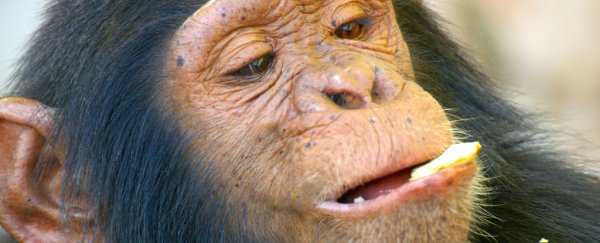You probably wouldn't pick up and eat a corn kernel from your own poop. That's because we humans are equipped with a finely tuned sense of disgust, which helps protect us from disease.
Meanwhile, a chimp will happily pick out seeds from its own faeces, and even sometimes eat the poop itself. It's a confusing spin on the idea that disgust helps prevent infections - but now researchers have discovered that it's possible to gross out a chimp after all.
There's a hypothesis that humans are disgusted by things like faeces, blood, and various bodily fluids because these substances can carry disease-spreading pathogens.
But we actually know very little about disgust responses in non-human primates - which is where chimpanzees (Pan troglodytes) come into the picture. As our closest living phylogenetic relatives, they have a thing or two to teach us about our parallels with other primates, and the possible evolutionary origins of our feelings when it comes to touching gross stuff.
Despite a tendency to sometimes pick through their own poop to find edibles, chimps have actually been observed to be quite hygienic with their food - at least when it comes to rinsing sand off an apple.
To investigate primate attitudes to contaminated food, in 2015 scientists from Kyoto University travelled to Gabon to study chimps at the International Centre for Medical Research in Franceville (CIRMF). The local chimpanzee subjects were in for quite a ride.
The team tested 41 adult chimps - an even gender split with an extra female - who live at the centre in Gabon and enjoy a vegetarian diet of fruits, vegetables, and baked soybeans.
In three experimental set-ups, the chimps were presented with situations where they would see, smell, or touch something potentially gross.
In one round, a piece of fruit was placed atop either a realistic poop replica or brown foam that looked like it. In another round, the team made the fruit smell like blood, semen, or - you guessed it - poop.
And in a third setup with the use of an opaque box, the chimps would feel a soft, moist substrate while reaching in to get their fruit (the substrate was a gross-feeling dough, not actual poop).
The results showed that chimps recoil from squishy substrates even at the promise of food, and they tend to hesitate eating food that smells like bodily fluids, and food that sits on top of a pile of excrement.
All this bodes well for the hypothesis that disgust helps us avoid possibly contaminated things.
"If chimpanzees and other primates can discern contamination risk via different cues, individuals with higher sensitivities to faeces and other bodily fluids may be less infected, which could have important health benefits," says lead author of the study, primatologist Cecile Sarabian from Kyoto University.
But before we embrace chimps as our kin, it's worth noting that smelly and crap-covered food still got eaten - the animals hesitated at first, but then got past the gross stuff.
However, reaching into an invisible pile of soft, mushy something - potentially something crawling with germs - was enough to ruin their appetites in most cases.
The team is quick to note it doesn't mean the chimps necessarily felt disgusted, since we can't judge their emotions just by watching them recoil from something. But it's still a clue as to why they would behave that way.
"What's great about these experiments, though, is that the observed responses are functionally similar to what ours would be, providing evidence that the mechanism underlying their behaviour could be similar to ours," says senior researcher Andrew MacIntosh, also from Kyoto University.
While the team says they will be expanding their disgust research to other non-human primates, there's good news for the chimps involved in this study - the animals are soon headed for a retirement sanctuary that's currently being built in Gabon.
The study was published in Royal Society Open Science.
